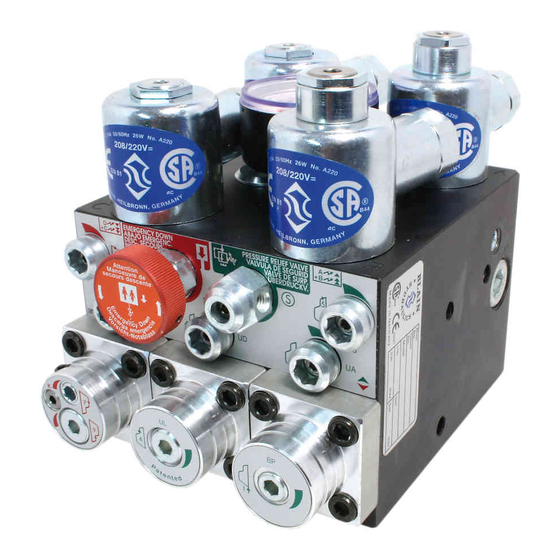Blain Hydraulics EV100 Series Manual de serviço - Página 12
Procurar online ou descarregar pdf Manual de serviço para Unidade de controlo Blain Hydraulics EV100 Series. Blain Hydraulics EV100 Series 16 páginas. Elevator valve

EV 100 Service Manual
Oil temperatures above 55 °C (130° F) should be avoided, otherwise the efficiency of the pump drops considerably
and its life is reduced. Aging of the oil is also accelerated.
Possible causes of overheating:
1. Up leveling too long due to the leveling speed being too slow or the slow down switch being set too low.
2. Machine room ventilation inadequate.
3. The frequency of operation is too high for the normal rate of heat dissipation.
Temporary solution:
As a temporary measure to avoid overheating of the oil resulting in the shut down of the elevator, the down speed
can be slowed to reduce frequency of operation until a permanent solution is installed.
Cooling systems
a. If the degree of overheating is not excessive and it takes for example two to three hours for the oil temperature
to rise from 20° to 55°C (70° to 130° F), it may be sufficient to improve air circulation around the power unit, for
example through the installation of a 0.05 to 0.10 kW ventilator extracting air out of the machine room or through
a fan of similar power, blowing air over the power unit.
b. Should the above be inadequate, depending on the size of the elevator, it will be necessary to install a 10-50
l/min (3 - 13 gpm) pump to circulate the hot oil through an air cooled radiator of about 0.1 to 0.2 fan kW. It is
also essential that there is sufficient extraction of warm air out of the machine room or that the cooler is out
side of the machine
room, for example in the elevator shaft. The effective cooling power of an air cooled radiator should not to be
confused with the power of the fan drive which normally need only be 0.1 or 0.2 kW. Normally, the effective
cooling power of a cooler need only be approximately ¼ of the main hydraulic elevator motor, in the case of
submersible drives.
Cooling systems for the above purpose should be switched into operation when the oil reaches 30° - 35°C (85° -
95° F).
System leakage (re-leveling)
The aim of manufacturers of hydraulic elevator control valves is to produce valves with zero leakage. Due to fine
contamination in the oil perfect sealing between valve parts may not always be achieved, leading to a slow down leak
of the elevator car.
It would become unnecessarily expensive to strive for perfect sealing in every valve in operation. Therefore, because
code requirements assure a safe releveling system whether descent of the car is caused by valve leakage or through
the cooling of the oil in the cylinder pressure system, a minor leakage of the control valve can be tolerated.
1. The European Code EN 81-2 require: that the loaded elevator does not leak downwards by more than
10 mm (3/8) in 10 minutes. This is the standard used to determine if a valve should be serviced for leakage.
2. For practical reasons, a quicker method for judging valve leakage is to close the ball valve in the cylinder line
and observe the gauge showing pressure in the cylinder chamber of the valve. If this pressure falls to zero in
less than 20 secs, it may be necessary to service the valve, depending on the diameter of the main ram and
sensitivity of the customer.
3. Down sinking giving the impression of leakage can be due to cooling of the oil.
When the elevator is at rest and the temperature of the oil falls, contraction of the oil in the cylinder and piping
causes the car to sink. This sinking is very slow but overnight without releveling could amount to as much as
half a meter, depending on the temperature drop of the oil and the volume of oil in the cylinder system. The
elevator releveling system, operating normally however, keeps the car at floor level.
4. In the case of Blain EV valves, see page 6 indicating where valve down leakage can occur.
Oct 02
BLAIN HYDRAULICS GmbH Boellinger Hoefe D-74078 Heilbronn Tel. +49 7131 28 21-0 Fax +49 7131 485216 www.blain.de [email protected]
Printed in Germany
Overheating of Power Units
- System Leakage
EN ISO 9001
10
